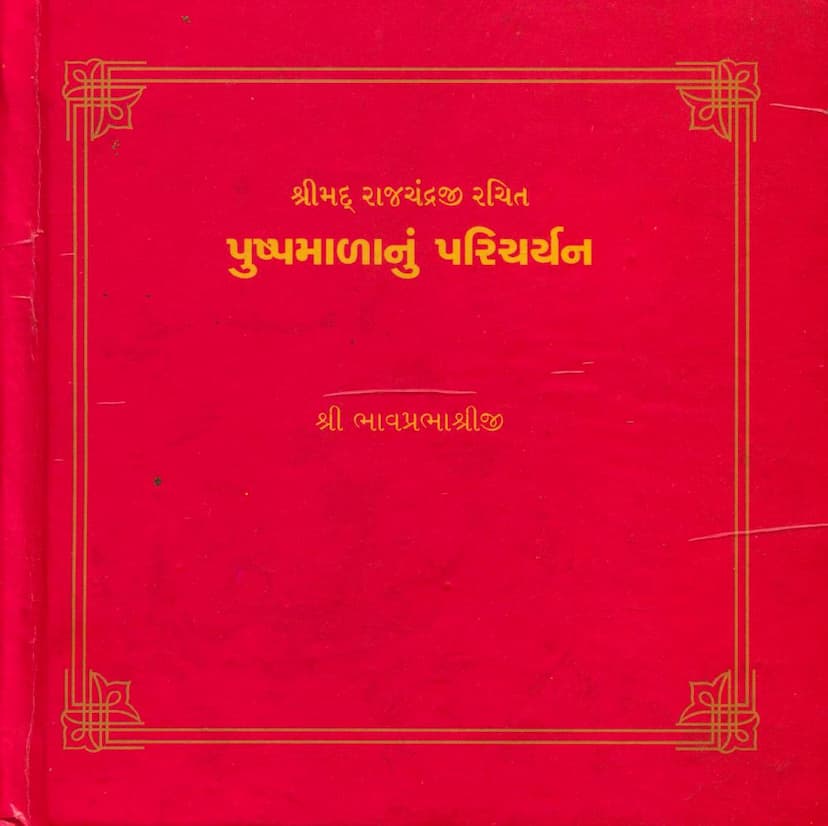Pushpmalanu Paricharyan
Added to library: September 2, 2025

Summary
This document is a Gujarati-language commentary and explanation of "Pushpamala," a work attributed to Shrimad Rajchandraji, with commentary provided by Shri Bhavprabhashreeji. The book was published by Subodhak Pustakshala Trust Mandal in Khambhat, Gujarat.
Here's a summary of the content based on the provided text:
Overall Purpose: The book "Pushpamala nu Paricharyan" aims to explain and elaborate on the teachings of Shrimad Rajchandraji's "Pushpamala." This work is described as a collection of 108 "fragrant words" in the form of verses (pushed - flowers) that guide individuals towards Moksha (liberation). The commentary emphasizes Shrimad Rajchandraji's profound spiritual insights delivered even at a very young age.
Key Themes and Content:
-
Spiritual Guidance for All: The "Pushpamala" is presented as a guide for everyone, from the poorest to the richest, and all age groups. It offers guidance on the principles of Dharma (righteousness), Artha (wealth), Kama (desire), and Moksha (liberation).
-
Overcoming Delusion (Moh): Each verse of the "Pushpamala" is said to have the power to dispel delusion and attachment. Regular study is believed to weaken the influence of worldly desires.
-
Daily Conduct and Self-Discipline: The text details daily routines, from morning to evening, and emphasizes how to conduct oneself in daily activities like eating, sleeping, and resting without creating new karmic bondage. It teaches how to refrain from harmful actions of mind, speech, and body.
-
Core Jain Principles: The commentary highlights the importance of:
- Vairagya (Detachment): Devotion characterized by detachment.
- Belief in Rebirth: Understanding the cycle of birth and death.
- Ethics and Good Conduct: Righteous living, non-violence, forgiveness, contentment, humility, compassion, self-control, altruism, chastity, truthfulness, and discernment.
-
The Importance of Sadhana (Spiritual Practice):
- Satsang (Good Company): The text strongly advocates for the inspiration and guidance gained from associating with virtuous people.
- Mantra (Contemplation): It encourages deep contemplation of the verses.
- Self-Reflection and Repentance (Pratikraman): The verses are seen as a tool for introspection and confessing past mistakes, leading to purification and detachment.
-
Day-by-Day Guidance: A significant portion of the book offers advice for each day, categorized by profession or life stage (e.g., for a king, a lawyer, a wealthy person, a laborer, a young person, an old person, a woman, a poet). This advice focuses on ethical conduct, responsible action, and spiritual awareness within the context of one's daily life.
-
Practical Advice: The commentary includes practical advice on:
- Dietary Discipline (Mitaahar): Eating in moderation and avoiding excessive indulgence.
- Time Management: Dividing the day into periods for devotion, study, work, and rest.
- Avoiding Bad Habits: Discouraging vices like intoxication and unnecessary attachments.
- Speaking Truthfully and Kindly: Emphasizing compassionate and truthful speech.
- Overcoming Laziness: The dangers of procrastination and the importance of diligence.
- The Value of Time: Recognizing that human life is precious and time is fleeting.
-
The Nature of Reality: The text touches upon the impermanence of the body and worldly possessions, urging readers to focus on spiritual pursuits. It also emphasizes that true happiness lies within and that attachment (mamata) leads to suffering.
-
The Role of the Guru: The importance of recognizing a true spiritual guide and following their teachings is implicitly stressed.
-
Praise for Shrimad Rajchandraji: Throughout the commentary, there is immense admiration for Shrimad Rajchandraji's wisdom, compassion, and spiritual attainment at such a young age. The author, Shri Bhavprabhashreeji, expresses deep reverence and gratitude for these teachings.
In essence, "Pushpamala nu Paricharyan" serves as a comprehensive guide for living a virtuous and spiritually oriented life, offering practical advice grounded in Jain philosophy and the profound teachings of Shrimad Rajchandraji. It encourages self-reflection, ethical conduct, detachment from worldly pleasures, and a constant focus on the ultimate goal of spiritual liberation.